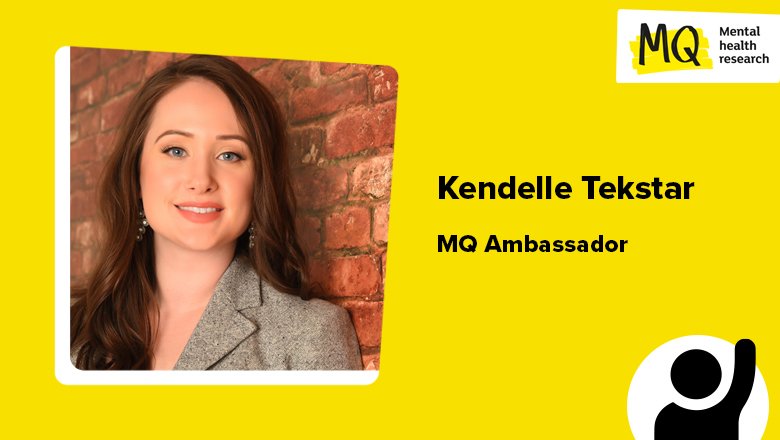MQ Ambassador profiles: meet Kendelle Tekstar

In a series of profiles, we at MQ Mental Health Research would like to introduce to you some of our wonderful MQ Ambassador. These are the individuals who support our charity organisation and lend their voices of lived experience expertise of mental illness.
MQ Ambassador Kendelle Tekstar, who is also a business psychologist, chatted to us to share her experience of mental health conditions and why she became interested in MQ Mental Health Research.
Kendelle, thank you so much for chatting with us. Firstly, what are your interests and favourite things about being alive?
I love horse riding, the outdoors, tennis, skiing, music, travel and my absolute happy place is taking in the beauty of the Cotswolds where I live through the ears of a horse.
Which mental health conditions do you live with?
Major Depressive Disorder and anxiety disorder.
Tell us about your lived experience. When did you first experience symptoms of mental health distress?
I first saw a psychiatrist when I was 18 years old as I was struggling with adjusting in my first year of university. Looking back, I had a lot of unmanaged anxiety leading up to that point, and this life event just triggered my anxiety peaking and depression following.
What do you understand about the causes of your condition?
There is a high prevalence of mental health problems in my family, and my psychiatrist categorised my diagnoses as genetically driven. As they say, genetics loads the gun and environment pulls the trigger.
What treatment have you received?
I started out with talk therapy, which led to me being prescribed mood medication. I’ve also done some CBT, DBT, and REBT – most of which was individual therapy, and some in a group setting.
What have you found helpful and why?
Consistent talk therapy over a few years was really key. I never had a proper outlet before this to discuss my feelings and experiences to make sense of why I am the way I am. There’s self-acceptance that came with owning my narrative. I also found REBT extremely helpful for combatting my tendencies towards perfectionism and over-achievement.
When your condition was or is difficult, what are the best things someone who cares about you can do to help you?
When people made themselves available for support, but didn’t force themselves on me, that was most helpful. These things don’t resolve overnight so patience is key when supporting someone presenting with affective symptoms.
Going into fixer mode is unhelpful on the other hand. Treating people like they are broken and need fixing ASAP generally doesn’t send a great message and puts added pressure on people to get better when they already have enough on their plate.
What lessons have you learned from your mental illness experience?
I still feel that depression stole some of my young years from me, and of course that’s sad, and it also propelled me into becoming a self-leader and set me on a path to uncover my real values and purpose in life. It has led me to become more self-aware, resourceful, and empathetic.
When you look back at your mental health experience, how would you describe your ongoing journey (of recovery or of challenges)?
In the here and now it’s about checking in on myself and recognising the early signs of depression before it becomes a real issue. When I notice my mood on the decline, I remind myself that I have far more coping skills than I did when I had my first depressive episode. And then it’s time to be intentional about putting those things into practice, and reaching out for help if I’m feeling stuck.
What role can education play in the future of mental health?
I think if psychoeducation was built into school curriculum, it would be a huge asset to students. I think there are basic therapeutic concepts anyone and everyone would benefit from learning, even when there isn’t a presenting issue.
What do you wish had been researched before you developed your condition?
I really wish there had been more evidence-base to guide the doctors I worked with to identify an efficacious mood medication for me.
There was a highly disruptive and discouraging guessing game that took place over a couple of years, where I was prescribed a handful of different antidepressants before finding something that helped my symptoms. It still feels like doctors are having to do a bit of a stab in the dark, so I’d love to see more research on this note!
What is special about MQ?
MQ is not only funding diverse, ever-important mental health research, it is a close-knit community of purpose-driven people I’m proud to be a part of. There is so much more impact to be made by MQ, so I greatly encourage you to join us — stay tuned into MQ projects and programmes and donate as you’re able.
Our thanks to Kendelle for sharing her story, highlighting just why research matters for mental health and why the work MQ Mental Health Research does must continue.
Source link
#Ambassador #profiles #meet #Kendelle #Tekstar

